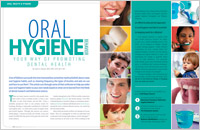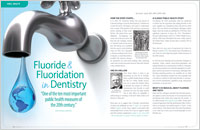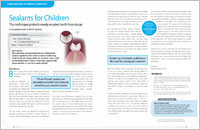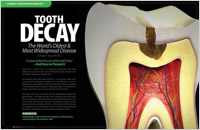Dental Exam
A comprehensive dental exam will be performed by your dentist at your initial dental visit. At regular check-up exams, your dentist and hygienist will include the following:
-
Examination of diagnostic x-rays (radiographs): Essential for detection of decay, tumors, cysts, and bone loss. X-rays also help determine tooth and root positions.
-
Oral cancer screening: Check the face, neck, lips, tongue, throat, tissues, and gums for any signs of oral cancer.
Professional Dental Cleaning
Professional dental cleanings (dental prophylaxis) are usually performed by Registered Dental Hygienists. Your cleaning appointment will include a dental exam and the following:
- Removal of calculus (tartar): Calculus is hardened plaque that has been left on the tooth for some time and is now firmly attached to the tooth surface. Calculus forms above and below the gum line and can only be removed with special dental instruments.
- Removal of plaque: Plaque is a sticky, almost invisible film that forms on the teeth. It is a growing colony of living bacteria, food debris, and saliva. The bacteria produce toxins (poisons) that inflame the gums. This inflammation is the start of periodontal disease!
- Teeth polishing: Remove stain and plaque that is not otherwise removed during tooth brushing and scaling.
Flouride Treatment
Fluoride is the most effective agent available
to help prevent tooth decay. It is a mineral that is naturally present
in varying amounts in almost all foods and water supplies. The benefits
of fluoride have been well known for over 50 years and are supported by
many health and professional organizations.
Fluoride works in two ways:
Topical fluoride
strengthens the teeth once they have erupted by seeping into the outer
surface of the tooth enamel, making the teeth more resistant to decay.
We gain topical fluoride by using fluoride containing dental products
such as toothpaste, mouth rinses, and gels. Dentists and dental
hygienists generally recommend that children have a professional
application of fluoride twice a year during dental check-ups.
Systemic fluoride strengthens the teeth that have erupted as well as those that are developing under the gums.
We gain systemic fluoride from most foods and our community water
supplies. It is also available as a supplement in drop or gel form and
can be prescribed by your dentist or physician. Generally, fluoride
drops are recommended for infants, and tablets are best suited for
children up through the teen years. It is very important to monitor the
amounts of fluoride a child ingests. If too much fluoride is consumed
while the teeth are developing, a condition called fluorosis (white
spots on the teeth) may result.
Although most people receive fluoride from food
and water, sometimes it is not enough to help prevent decay. Your
dentist or dental hygienist may recommend the use of home and/or
professional fluoride treatments for the following reasons:
-
Deep pits and fissures on the chewing surfaces of teeth.
-
Exposed and sensitive root surfaces.
-
Fair to poor oral hygiene habits.
-
Frequent sugar and carbohydrate intake.
-
Inadequate exposure to fluorides.
-
Inadequate saliva flow due to medical conditions, medical treatments or medications.
-
Recent history of dental decay.
Remember, fluoride alone will not prevent tooth decay! It
is important to brush at least twice a day, floss regularly, eat
balanced meals, reduce sugary snacks, and visit your dentist on a
regular basis.
Related Preventive Dentistry Articles
 Oral Hygiene – Dental Health for Life
Oral Hygiene – Dental Health for Life
The best tools for maintaining your oral health and minimizing dental problems are a quality toothbrush, toothpaste, a roll of dental floss, approved mouthwash and good diet. Unfortunately, myths and folklore abound on how and what to use to best effect. This article cuts through the confusion with a winning game plan for oral health... Read Article
 Fluoride and Fluoridation in Dentistry
Fluoride and Fluoridation in Dentistry
The Center for Disease Control says that water fluoridation is, "One of the ten most important public health measures of the 20th century." Extensive systematic reviews of the evidence conclusively show that water fluoridation and fluoride toothpastes both substantially reduce dental decay. Learn why through the amazing fluoride story... Read Article
 Sealants for Children
Sealants for Children
The tiny grooves in your child's back teeth are ideal places for cavities to form. But you can take a proactive role in preventing this with dental sealants. These are protective plastic resin coatings placed in these tiny pits and fissures of teeth, actually sealing them from attack. It's a wonderful method of decay prevention that every parent should consider... Read Article
 What is Tooth Decay? – And How to Prevent It!
What is Tooth Decay? – And How to Prevent It!
Tooth Decay is an infection, and many people don't realize that it is preventable. This article is the first in a series about tooth decay, perhaps the number one reason children and adults lose teeth during their lifetime. Explore the causes of tooth decay, its prevention and the relationship to bacteria, sugars and acids... Read Article